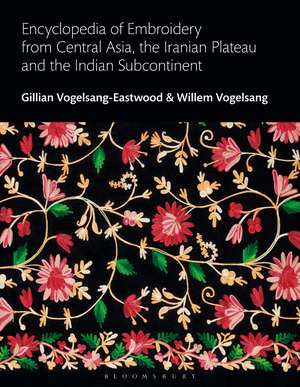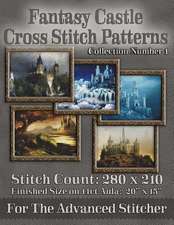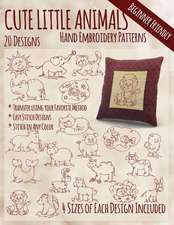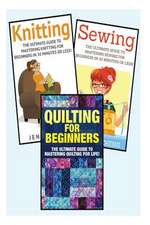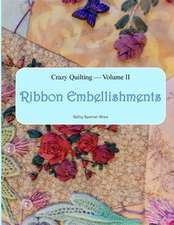Encyclopedia of Embroidery from Central Asia, the Iranian Plateau and the Indian Subcontinent: Bloomsbury World Encyclopedia of Embroidery
Autor Gillian Vogelsang-Eastwood, Willem Vogelsangen Limba Engleză Hardback – 13 ian 2021
Preț: 984.40 lei
Preț vechi: 1720.07 lei
-43% Nou
Puncte Express: 1477
Preț estimativ în valută:
188.53€ • 194.24$ • 157.93£
188.53€ • 194.24$ • 157.93£
Carte disponibilă
Livrare economică 01-15 februarie
Preluare comenzi: 021 569.72.76
Specificații
ISBN-13: 9781350017245
ISBN-10: 1350017248
Pagini: 488
Ilustrații: 465 colour and 36 bw illus
Dimensiuni: 210 x 270 x 29 mm
Greutate: 1.82 kg
Editura: Bloomsbury Publishing
Colecția Bloomsbury Visual Arts
Seria Bloomsbury World Encyclopedia of Embroidery
Locul publicării:London, United Kingdom
ISBN-10: 1350017248
Pagini: 488
Ilustrații: 465 colour and 36 bw illus
Dimensiuni: 210 x 270 x 29 mm
Greutate: 1.82 kg
Editura: Bloomsbury Publishing
Colecția Bloomsbury Visual Arts
Seria Bloomsbury World Encyclopedia of Embroidery
Locul publicării:London, United Kingdom
Caracteristici
Provides detailed coverage of the material, technical, artistic and design dimensions of the subject as well as its development over time, up to and including its use by modern fashion designers from the region
Notă biografică
Gillian Vogelsang-Eastwood is Director of the Textile Research Centre, Leiden, The Netherlands.Willem Vogelsang is former Deputy Director of the International Institute for Asian Studies, Leiden, The Netherlands.
Cuprins
ContributorsPrefaceAcknowledgementsSection One: Background Information1. Introduction 2. Fibres, Threads and Ground Materials 3. Embroidery Tools and Equipment 4. Hand and Machine Embroidery Techniques 5. Designs and Designers Section Two: Historical Embroideries6. Introduction: Evidence for early Central Asian and Iranian Plateau Embroidery 7. Safavid Period Embroidery 8. Ancient and Historical References to Indian Subcontinent Embroidery9. Snapshot: Medieval Nepalese Embroidery 10. The Mughal Court and Embroidery 11. Snapshot: Indian Quilts for European Markets Section Three: Embroidery from Central Asia12. Introduction13. Snapshot: Embroidered Caps from Central Asia and Afghanistan 14. Embroidery from Kazakhstan15. Embroidery from Kyrgyzstan16. Embroidery from Uzbekistan17. Suzanis18. Embroidery from Turkmenistan19. Embroidery from TajikistanSection Four: Embroidery from the Iranian Plateau20. Introduction21. Snapshot: Embroidered Zurkhaneh Breeches 22. Qajar and Later Embroidery 23. Embroidery on Modern Iranian Regional Clothing24. Embroidery from Afghanistan 25. Snapshot: Afghan Coats and Western FashionSection Five: Embroidery from the Indian Subcontinent26. Introduction27. Embroidery from Baluchistan28. Embroidery from Pakistan29. Phulkari Embroidery 30. Introduction to Indian Embroidery31. Woven and Embroidered Shawls from Kashmir32. Embroidery from Northern India33. Embroidery from Western and Southern India34. Indian Metal thread embroidery (Zardozi)35. Snapshot: Three Examples of Indian Beadwork36. Snapshot: Indian Fashion Designers and Hand Embroidery37. Snapshot: The Roles of NGOs and Other Groups within the Field of Hand Embroidery in India38. Embroidery from Nepal39. Embroidery from Bhutan40. Embroidery from Bangladesh41. Snapshot: Embroidery and Lace from Sri Lanka 42. Snapshot: 'Embroidery' from the MaldivesSection Six: AppendicesAppendix 1a: Drawings of the Embroidery StitchesAppendix 1b: A-Z List of Embroidery StitchesAppendix 2: International Collections with Relevant EmbroideriesBibliographyIndex
Recenzii
An essential resource for students and scholars.
The encyclopedia will provide researchers with a strong knowledge base, including local language for techniques and a list of museums and institutions with related objects and collections for further study. The volume includes 125 excellent stitch diagrams based on "family" group, followed by a stitch list for practitioners, conservators, and curators. The true encyclopedia style of this book makes it easy to use as a reference.
This volume is a great reference book for archaeologists, anthropologists, historians, art historians, textile curators of museum collections, and private collectors. It is a source of inspiration for embroiderers, designers, textile artists, and anyone passionate about embroidery from this interesting area.
Encyclopedia of Embroidery is a very accessible book. It is well laid out, easy to navigate, and easy to read. It is filled with facts, but these facts are presented in a personal and understandable way. The author's obvious interest and delight in the subject matter, her genuine interest in, not only embroidery but in sharing her knowledge and love of the subject with the reader, is palpable.
This book is relatable, practical, easy to read and packed with information. As with the first volume - this is not just a book, it is a legacy.
This important encyclopedia covers a vast geographic and historical span with not only scholarship and technical expertise but with fascinating insights. Readers from many disciplines, art and embroidery, sociocultural historians and anthropologists as well as those interested in intercultural links will learn a lot from this magnificent production. Gillian Vogelsang-Eastwood and Willem Vogelsang should be complimented on a classic, which provides a vast amount of information within a single volume.
Gillian Vogelsang-Eastwood follows up her masterful volume Encyclopedia of Embroidery from the Arab World with seven further volumes covering the rest of the world. Each is replete with historical and geographical background and delineates the notable embroidered products of each region set into their social context. The techniques are illustrated with clear diagrams of the stitches employed. An essential guide for every textile enthusiast.
An extraordinary achievement, comprehensively exploring the rich embroidering traditions of three regions. Profusely illustrated with photographs, diagrams, and stitch layouts, accessible in writing and explanation, this work will stand as a lasting reference tool for academics, artists, and enthusiasts.
The encyclopedia will provide researchers with a strong knowledge base, including local language for techniques and a list of museums and institutions with related objects and collections for further study. The volume includes 125 excellent stitch diagrams based on "family" group, followed by a stitch list for practitioners, conservators, and curators. The true encyclopedia style of this book makes it easy to use as a reference.
This volume is a great reference book for archaeologists, anthropologists, historians, art historians, textile curators of museum collections, and private collectors. It is a source of inspiration for embroiderers, designers, textile artists, and anyone passionate about embroidery from this interesting area.
Encyclopedia of Embroidery is a very accessible book. It is well laid out, easy to navigate, and easy to read. It is filled with facts, but these facts are presented in a personal and understandable way. The author's obvious interest and delight in the subject matter, her genuine interest in, not only embroidery but in sharing her knowledge and love of the subject with the reader, is palpable.
This book is relatable, practical, easy to read and packed with information. As with the first volume - this is not just a book, it is a legacy.
This important encyclopedia covers a vast geographic and historical span with not only scholarship and technical expertise but with fascinating insights. Readers from many disciplines, art and embroidery, sociocultural historians and anthropologists as well as those interested in intercultural links will learn a lot from this magnificent production. Gillian Vogelsang-Eastwood and Willem Vogelsang should be complimented on a classic, which provides a vast amount of information within a single volume.
Gillian Vogelsang-Eastwood follows up her masterful volume Encyclopedia of Embroidery from the Arab World with seven further volumes covering the rest of the world. Each is replete with historical and geographical background and delineates the notable embroidered products of each region set into their social context. The techniques are illustrated with clear diagrams of the stitches employed. An essential guide for every textile enthusiast.
An extraordinary achievement, comprehensively exploring the rich embroidering traditions of three regions. Profusely illustrated with photographs, diagrams, and stitch layouts, accessible in writing and explanation, this work will stand as a lasting reference tool for academics, artists, and enthusiasts.
